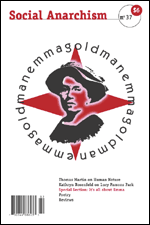Emma: A Play
Emma: the Play by Howard Zinn. 2nd ed. Cambridge: South End Press. 2002.
Where is Emma Goldman now that we really need her?
We need her nanosecond, conversational retorts, although usually bitingly short, always exposing complex power relationships between people and the state, or between women and men. As police drag her off a Chicago stage in 1906, a reporter captures this quintessential exchange:
“Thought you’d come here and make trouble, eh?” the Captain said… “Behave yourself,” Emma snaps sharply. “Talk like a man, even if you are a policeman.”[1]
One can imagine her famously lecturing today on, say, the Supreme Court’s selection of a president; or the prude John Ashcroft and his patently unconstitutional U.S. Patriot Act; or the government holding nearly 1,000 human beings in secret prisons the world over without charge and without recourse to defense attorneys. On 18 May 1934, within hours after the Conscription Act became law, Emma is at the Harlem River Casino, asking an overflow audience:
What is patriotism, my friends? Is it the love of your government? No, it is love of your country, of your fellow men and women. And that love, that patriotism, may require you to oppose your government. Mark this day, my friends…the young men of this nation will now be marched into the slaughterhouse of the war in Europe. I say to you, young men in the balcony, and to young men everywhere. Refuse to die! Refuse to kill![2]
If Iraqi war-managers Cheney, Rumsfeld and Wolfowitz cannot abide a Shiite cleric’s newspaper so they order it shuttered. Now that’s a fine lesson in democratic self-determination. What if Mother Earth, the journal Emma edited with Alexander Berkman for the twelve years leading up to World War I, was currently an Internet blog?
No topic, be it free love for puritans, or atheism for the Pope was too strong…the much publicized tenet that the meek shall inherit the earth she called preposterous, and an incentive for the proletarian workingman to remain enslaved, for the capitalist to continue as a parasite.[3]
Well, she’s not here. Sadly.
Yet and still, we have Howard Zinn’s Emma: A Play, is available. Zinn’s son, Jeff, first staged the work in New York in 1976; after which theatergoers in Boston, London, Tokyo, Edinburgh Festival, and again in New York trooped to see performances. If any theater director reads this review, I urge you to bring Zinn’s zestful portrait of Emma Goldman, and the cast of anarchists who were in and out of her life, to the stage again. Soon.
Supporting Emma in Zinn’s play, as in her life, are Helena, her sister; Alexander [Sasha] Berkman, her political comrade and lover who spends much of this play influencing events from prison after attempting to kill Henry Clay Frick, manager of Andrew Carnegie’s steel mills; Dr. Ben Reitman, an unconventional physician who becomes her lecture manager and passionate lover; Anna Minkin, a member of the commune Emma is the central figure; Fedya, an artist and member of the commune; Vito, who labors in sewers; Lizbeth, a prison nurse who befriends Emma in prison, teaching her nursing and midwifery.
Zinn, in two acts, deftly sketches this remarkable woman’s political, religious and literary values, as well as her legendary lectures. We see her first when she is a 22-year-old seamstress living with her husband, Jacob Kershner, and her immigrant family in Rochester, N.Y. As her fame spreads, so do the invectives, arrests, and plaudits.
We see her last, as most of the audience in Harlem River Casino is applauding approvingly of her seditious opposition to the draft and the war. She stands at center stage defiantly, waiting for federal agents to march down the aisles to arrest her. Sasha holds one hand. Anna holds the other. Vito is at her side, too. Days earlier, the federal government revokes her former husband’s citizenship, leaving her without citizenship. Federals agents are intent on arresting her as an illegal alien. Their real fear is arrest her for speaking will cause a public outcry for violating her First Amendment rights.
The government wastes no time deporting her. She is 48 and will spend the rest of her life in exile with Sasha, first in Russia, then, vocally disillusioned with Lenin’s authoritarian state communism, mostly in France. Sasha became seriously ill, and takes his life in 1936.
Four years later she returns to the United States. Frances Perkins, the exceptional Secretary of Labor in Franklin Roosevelt’s cabinet, invites her to speak in the United States on condition that she confines any remarks to drama. She respects the restraints, and comments with great insight on Ibsen, Strindberg, Shaw and Chekhov, lectures that are collected under the title The Social Significance of the Modern Drama.[4]
Zinn, I am certain, will not object if there is a revival of his play, if for no other reason than to remind us of a woman living her life with courage, great intellect, and unquenchable compassion for her fellow human beings. Because of her life’s example, perhaps, even softened as theater, others will dare to live freely, to act against oppressive government, and to challenge the norms of our day.
Let the curtains rise! Since we cannot expect to see Emma work after death, we can be inspired by Zinn’s text.
Footnotes
[1] Emma. p. xvii.
[2] Emma. p. 138-139.
[3] Forman, James D. Anarchism: Political Innocence or Social Violence? New York: Dell Publishing. 1975.
[4] Goldman, Emma. The Social Significance of the Modern Drama. New York: Applause Theatre Book Publishers. 1987.

